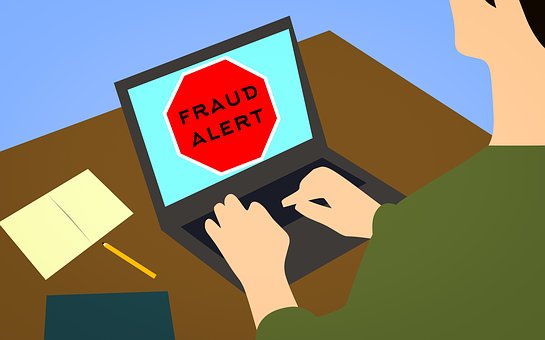One topic I’ve discussed ad nauseam over the years is fraud. Typically, I’m talking about fraudulent asset transfers.

Usually, I rail against the shady as hell consultants that I compete with. They tell borrowers that the way to settle their debt is to fake the sale of their business to a friend, family member, or anyone willing to pretend to be a buyer. Or create a new entity themselves, then sell it to that entity.
Today, I want to talk about a different type of fraud: seller fraud.
The purchase of a business is one of the most common uses for an SBA loan. In that type of transaction, the owner of an existing business sells his business to a buyer as a going concern.

Of course, before a buyer hands over a check for several hundred thousand dollars, there is due diligence performed. The buyer and the SBA ask for financial statements, tax returns, bank statements etc. They do their best to confirm that 1) the business has sufficient cash flow and profitability to warrant the purchase price and 2) that the information being provided is accurate.
For larger companies, audited financial statements are par for the course. Audited financials are financial statements that an independent auditor verifies. This means that they confirm that the numbers are accurate by matching up “source data” like bank statements, shipping invoices etc.
Audited statements are a pre-requisite when you are talking about middle market and large corporate businesses. But for small businesses, the reality is that audited financials are often cost-prohibitive. For that reason, the majority of small business purchase and lending transactions are based on tax returns.
The information found on small business tax returns is not verified as rigorously as audited financial statements. This means that if you tell you’re accountant that you sold $100 worth of widgets, that’s what he’ll report.
Snore. Who cares about the difference between audited financials and tax returns?
I agree, it’s pretty dry material. I haven’t talked about this stuff since college. But I’m talking about it for a reason. The reason why it matters is due to the lower level of scrutiny that tax returns require as compared to audited financials.
This means that when non-audited financial statements (such as tax returns) are used to conduct due diligence, the chances of fraud increase.
After all, if nobody is verifying the accuracy of the numbers, it’s not hard to imagine some business owners getting creative when they to sell their business. And that’s being diplomatic. In some cases, sellers are engaging in outright fraud.

What are examples of sellers committing fraud?
Falsified Documents
SBA lenders and buyers do their best to vet every transaction. But the reality is that if a borrower files several years of false tax returns, making the business look profitable in the process, that can be tough to catch.
If an unscrupulous seller is willing to fake it for 2 years (and pay the corresponding income taxes), it can turn a worthless business into a million dollar business.
Let’s look a few simple ways that a seller can falsify an income statement:

- You can attempt to verify revenue by checking bank deposits, but that doesn’t mean you can 100% rely on it. Revenue can be faked by depositing funds from an outside source. For example, if I deposit a check from a different account for $10,000 (perhaps I have a home equity loan that I draw from), and do that every month, I’ve just artificially boosted my revenue by $120,000 for the year. That’s enough to make a buyer believe that they business can support a $4000 monthly loan payment without breaking a sweat.
- On the flip side, it’s not all that difficult to omit expenses. If I run a cash business, I can easily pay for expenses in cash and never show them on my P&L. Or I can pay business expenses with personal funds or credit, and it will never show up on the business income statement.
Just by doing either of the above, a shady seller can magically transform a business that loses money into a profitable business that buyers are willing to spend hundreds of thousands on.
2. Ignoring or Strategically Evading a Non-Compete

I’ve heard this scenario most often regarding CPA firms, so I’ll use them as an example. Let’s say you buy a CPA practice for $500K. After a few months, you start to notice that revenue is less than you expected.
You go down the client roster that the seller provided to you. Sure enough, about 30% of the clients have not been heard from. Hmmmm, that’s interesting. So you do a little digging.
You do a quick Google search, and your suspicions are confirmed. The seller, despite a non-compete clause, has moved a few towns over and opened a “new” accounting firm.
You immediately call the seller. They tell you that they are technically outside the 20 mile limit that the non-compete called for. And those missing clients? Yes, they followed the seller to the new office. Nothing they can do about that, they say. That’s the client’s choice.
Sure, you could sue. But that’s going to take time and money. Even if you prevail, there’s a difference between winning a civil suit and collection on a civil suit. By the time you obtain the judgement, any available cash could be long gone.
Will the SBA forgive a loan when the loan default was caused by seller fraud?
In my experience, no. Even if you purchased a lemon of a business, the SBA still expects full repayment.
I’ve fielded my fair share of calls from angry business owners on this topic. They were duped, and they want someone to answer for it. They know the seller isn’t going to do the right thing, so they are hoping the SBA will come to the rescue. Here’s how the conversation usually goes:
Business Owner: The SBA approved a loan and the business was a hoax!
Me: Yes, the SBA takes steps to verify that a business is legit and can afford to repay a loan. But they aren’t doing it for your benefit. They are doing it for theirs. In other words, they taking reasonable steps to ensure they get their money back. And when they approve a loan, they feel that the loan has a good chance to be repaid. A loan approval does NOT mean they are certifying to you that the business is legit and the financials are accurate.
Business Owner: I want to sue the seller. Will the SBA join the suit and share the cost with me?
Me: I don’t recall ever seeing that happen. If I had to guess, I’d say banks and the SBA aren’t interested in that sort of thing for a couple of reasons.
First, they have no idea what the truth is, and it could be expensive to figure it out. It’s not always easy to tell the difference between seller fraud and buyer incompetence. Even if it looks like fraud to me, I have no idea what the threshold is when it comes to a civil suit.
Second, if they admit there was an issue with the seller, it could be hard to pursue the borrower, as it may raise questions about whether the lender properly underwrote the loan. (Note: the SBA does always look at SBA loan defaults closely, especially early defaults.)
Conclusion
If the seller screwed you, you always have the court system at your disposal to hold them accountable. However, the SBA and your lender are not likely to get involved, and will expect you to repay the loan in full. They will consider an SBA Offer In Compromise if you can’t afford to repay the debt in full, but don’t expect any breaks or special treatment along the way.


